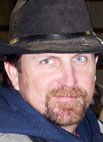
“It’s all I’ve ever known,” shrugged Geno Middleton. “Raising, breaking and training horses has been in my blood. I’m the third generation to do this,” he explained of Geno Middleton Stables north of West Plains, Mo., in Howell County.
“I grew up near Nixa, Mo., and moved over here about eight years ago,” he recalled. “My grandfather, Quentin, and my dad, Jerry, both worked training horses when I was growing up.”
Geno began training horses professionally when he was 12 years old and won his first World Grand Championship title with a customer’s horse when he was 18. “My granddad was a Baptist preacher and always worked with horses. So much that it became his career and was passed down to my dad and now me.”
His wife, Barb, also plays a strong role in the operation. “She is a key part of all this. She works everyday with me here on the farm as well as keeping the books, records, billing and the office work that goes along with a business like this,” he explained. “She is my soul-mate and true partner in life,” he smiled. They have three kids, Wesley, 16; Madison, 15; and Dusty, 14. Geno moved to the area of Howell County in 2004 and built the barn here in 2005. “At first, my barn was still in Marshfield, Mo., so I spent all that time traveling back and forth,” he said. “It didn’t take long before I built the barn here,” he chuckled.
Horses
The Middleton’s raise Missouri Fox Trotters for show. “We train all horse breeds but we own and raise Missouri Fox Trotters. They are great all around horses for trail riding, pleasure and of course for showing,” he said. “They are judged on their physical make-up, how they use themselves and if they offer a smooth ride. “We have about 50 horses we own and keep an additional 14 to 18 customer horses that we train,” he explained. They bring them here and we keep them on a 30-day schedule. If needed, we break the horses to a saddle and then begin working with them for show. They are judged on their walk, fox trot and canter, so I work with them on all those things.
“Ultimately I show the horses, but sometimes the owners do come in and show them,” he explained. “Showing horses I’ve trained is the best advertisement for my stables. For example, this year I trained three World Grand Champions and five Reserve World Grand Champions. “Word-of-mouth and show experience is the best advertisement,” he reasoned. “I have customers from all across the United States: Utah, Arkansas, Florida, Texas and Arizona to name a few.”
Shows
“We show all across the U.S.; in Florida, Texas, Arkansas to mention a few, and of course the World Champion Missouri Fox Trotter Association Show and Celebration is in Ava, Mo., each September. It starts Labor Day weekend and lasts a week, and we show every night,” he said. “We even showed eight to 10 head in a day/night,” he added. “And that’s an all day deal with the horses. We groom them by braiding their manes, clip them up and of course they are bathed daily. Show day is even more important, when we take extra care in the washing, clipping and brushing of the horses. It’s a pretty intense day, but pays off when you get to see a winner,” he added with a smile.
The farm and the future
The Middleton’s have 40 acres on their farm in Pomona, Mo., and lease two other pasturelands. “We keep our young horses and broodmares out on pasture and all the horses we’re training are kept in stalls,” Geno explained. “We buy our hay from local farmers and have been using Bermuda hay. It is more palatable and has lower protein so it’s easier for horses to digest. We use Alfalfa for the protein when we need to add weight to a horse. We use Mana Pro Rice Bran and Horse Manna supplements to give our horses ‘that great show look.’”
Geno plans to continue to raise his own horses but also explained some of his future goals. “I have recently received a corporate sponsorship from Manna Pro and we just finished a gaited horse training video. I have also held clinics all over the U.S. and plan to do more of those. Working with Manna Pro will allow me to attend more fairs and festivals and host clinics on training, breaking and other horse needs.”
Geno admitted that being self-employed such as he is, is very demanding. “But you’ve got to love what you do and I’m lucky that I do.”







